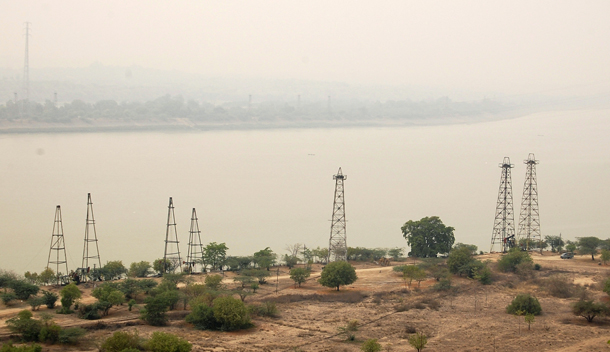RANGOON—Burmese Energy Minister Than Htay said on Monday that the country “is about to launch bidding for offshore blocks” but did not give additional details or indicate when the process would start.
The auction for exploration rights has been highly-anticipated since the US government announced in July that it would no longer prohibit companies from investing in Burma’s controversial oil and gas sectors, hitherto off-limits due to economic sanctions on the previously military-ruled country.
Analysts believe the apparent delay in bidding for offshore gas reserves could be down to the country’s ongoing new Foreign Direct Investment (FDI) law saga. The legislation has been through several drafts and awaits parliamentary approval, amid speculation that “cronies” in Burma—business elites with ties to the old military junta—are lobbying for a strict investment regime to forestall competition from outside.
“It is likely [the government] wants to wait until the foreign investment law is finalized for procedural reasons,” said a Burmese energy company representative who asked to remain anonymous.
Seeking to reassure delegates, Than Htay told the Myanmar Oil Gas and Power (MOGP) summit in Rangoon that,“once we launch the bidding process we will give bidders sufficient time to formulate their applications.” The event was sponsored by industry heavyweights Royal Dutch Shell, Conoco-Phillips and Unocal.
A Reuters report published on Wednesday quoted an unnamed official saying that the bidding would take place later in 2012.
Oil, gas and hydropower have a contentious history in Burma with revenues typically difficult to quantify, and allegations that money has been diverted to armed forces use or placed in bank accounts overseas.
However, political and economic reforms undertaken since an military-backed but officially civilian government took office in March 2011 have seen Western sanctions suspended or relaxed. This has prompted a scramble for the country’s energy resources which to date have been dominated by Asian companies, though Total and Chevron have major offshore gas investments in Burma that pre-date sanctions.
In May and June, Burma’s opposition leader Aung San Suu Kyi urged investors to steer clear of state-run energy company Myanmar Oil & Gas Enterprise (MOGE) with which would-be foreign investors must carry out joint ventures.
The Nobel Laureate’s words, however, did not dissuade the US from lifting investment restrictions on the sector in July, and some companies with long-standing investments in Burma’s energy sector say that the country is good place to do business.
A presentation given by Mukesh Jain of India’s Essar on Monday said that Burma has “a very cooperative government, very friendly people and a very conducive working environment.” With Indian government funding, Essar is building a new port and jetty at Sittwe—the capital of conflict-ridden Arakan State in western Burma.
Organizations such as Transparency International, a Berlin-based NGO that monitors corruption worldwide, put Burma near the bottom of its graft rankings. Companies looking to invest in the former pariah state have to navigate a relatively-obscure business and political environment, potentially further complicating the eventual offshore gas bidding process.
“A lot of companies will be interested in how transparent the bidding process will be and how it works,” said Christopher Drew, country manager for Twinza Oil, an Australian company that faced calls to pull out of Burma in the past due to investments during the country’s military junta rule.
Draft versions of the proposed FDI law include possible tax holidays for foreign investors—a proposal dismissed as unnecessary by analysts such as Dr. Sean Turnell, based at Australia’s Macquarie University. However, some businesses are saying that so-called “corporate social responsibility” should be rewarded by the Burmese authorities.
“The government should have more favorable tax conditions for companies that show respect for human rights and the environment,” said Nandar Thaing, contract manager with Parami Energy, a Burmese company that carries out support work for oil and gas extractors.
Burma’s electricity shortages stand in stark contrast to its energy resources, making life tough for ordinary Burmese and potentially deterring foreign investors. Only one in four Burmese have electricity, according to the Asian Development Bank (ADB). In May, nationwide candle-lit protests against electricity shortages took place in cities across Burma.
Burma needs heavy investment in power generation, regardless of related investments in resource extraction, say some analysts. The ADB reported recently that “poor maintenance of power transmission and distribution systems leads to high power losses,” and speaking at the MOGP event in Rangoon on Tuesday, Henry Zaw Tun, an energy consultant, said that, “we need US $2billion per year investment in power plants.”
Pledging to address Burma’s power shortages, Than Htay said on Monday that, “the government is taking all necessary steps to meet the demand for electricity this coming summer and for the longer term thereafter.”
However, uncertainty about power supplies could curb investors’ enthusiasm unless the government lives up to its pledges. Win Khaing, of the Myanmar Engineering Society, said on Tuesday that, “without the guarantee of power, investors will think twice about coming to Myanmar.”
Discussing the possible importance of the energy sector to Burma’s economic future, Shell’s Marc Gerrits said that Burma could emulate neighbors such as Thailand and Bangladesh, where 70 percent of energy is supplied by gas.
“As Burma’s economy develops, gas will help ensure that a modernizing city such as Yangon will reduce potential public health problems that come with other energy sources,” he said.
















